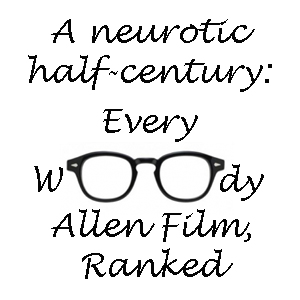Sorry it took me awhile to compile my rankings of Woody Allen’s films. I got a little neurotic about making sure everything is in the proper order that reflects my opinions. As you might guess, I can relate to The Woody Allen Character in these movies, whether played by Allen himself or a surrogate actor (and in rare cases, actress).
As we approach Allen’s 50th full-length film as a director – “Coup de Chance,” planned for this year – it seems a good time to rank all of his work. (I’ve included his one TV series, which plays like a long film; and the films where he did not direct but had a hand in the writing.)
At first blush, Allen isn’t versatile – all his films are recognizably “Woody Allen films.” But within the template of a psychologically troubled man navigating relationships and philosophical questions, he has a remarkable ability to not repeat himself.
He occasionally dips into genre (one sci-fi film, one almost-horror film, several history pieces and many fantasies – although usually with only one element of magic realism). But he takes new angles into old questions, often boosted by one experimental filmmaking touch. He told stories in the style of the Zucker Bros, “Mystery Science Theater 3000,” “The Office,” “Curb Your Enthusiasm” and “Only Murders in the Building” before those styles were cool.
Allen is sometimes a perfectionist, and other times he cranks out films with his unofficial troupe of the moment. Since gaining creative control of his career fairly early on, he’s never been commercially minded, but he’s had an excellent sense of the psychological appeal of a tight 100-minute film.
One thing we can all agree on is that he’s prolific, having released a film every year since 1971 with only six exceptions. He didn’t miss an annual release from 1982 through 2017. Since 1972, he’s been the director and at least co-writer of all of them, while taking an acting role in 32 entries and narrating two others.
Before you get too mad about the films I ranked lower or higher than is typical, keep in mind that I give a “recommend” (three stars or better) to 49 of his movies. He’s not perfect every time, but I’m almost never bored by an Allen film. Click on each title for a full-length review. (Allen is the solo writer and director unless otherwise noted in italics.)
(Updated in December 2025 with “Coup de Chance.”)
56. “Don’t Drink the Water” (1969)
Directed by Howard Morris; written by R.S. Allen and Harvey Bullock, based on Allen’s play
As evidenced by Allen’s 1994 course-correction remake, the play is a dry historical comedy. The writers actually adapt it faithfully. But the actors (particularly sitcom legend Jackie Gleason) think they’re in a broad farce, and the director and editor think this is a serious spy drama. It makes for a rough viewing experience.
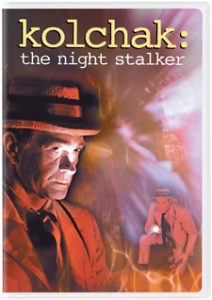
55. “Shadows and Fog” (1991)
The title describes both how the film looks – its best trait – and the murkiness of its reason for existing. Possibly the best-cast bad film ever made, it’s not quite a serial-killer or horror parody (although “Halloween’s” Donald Pleasance plays a mad scientist). Nor does it commit to the standard Allen romance beats between a nebbish (Allen himself) and a beautiful woman (Mia Farrow). Every scene is like something from a rehearsal before anyone has figured out the film’s tone.
54. “What’s New Pussycat” (1965)
Directed by Clive Donner
In his debut screenplay, Allen repeats the same joke, with only minor variations: Peter O’Toole’s Michael effortlessly attracts women and Peter Sellers’ Fritz automatically repulses them. Providing relief from the predictability is Allen’s Victor, a preview of his standard neurotic type. I’m not a big fan of farce as a genre, although the climactic go-kart race is worth a smile. The big flaw is the far-too-slow overall pacing by Donner.
53. “What’s Up, Tiger Lily?” (1966)
Co-directed with Senkichi Taniguchi; co-written with Frank Buxton, Louise Lasser, Julie Bennett, Len Maxwell, Mickey Rose, Bryna Wilson, Hideo Andô, Ben Shapiro
In a concept that predates “MST3K” by 22 years, Allen (in his directorial debut) and his friends take a bad low-budget Japanese spy actioner, “Key of Keys,” and dub new dialog over the events. Everyone has fun, and some of it translates into absurdist comedy. Allen’s original 1-hour cut must certainly be better than the extended studio version, which has long breakaways to Lovin’ Spoonful playing the titular song.
52. “Sleeper” (1973)
Co-written with Marshall Brickman
As a sci-fi fan, I enjoy in the abstract how Allen pokes fun at “2001” (even using the HAL-9000 voice actor), “THX-1138” and “Star Trek.” The time-travel premise predicts “Austin Powers,” but it’s striking how the scene of Allen’s Miles waking up in tinfoil and shuffling around a lab is much less funny than Powers’ post-cryosleep piss. Also including a jab at future sex (via the Orgasminator, similar to “Futurama’s” suicide booth), “Sleeper” isn’t dumb, but it is drabber than Allen’s other Seventies romps.
51. “Hollywood Ending” (2002)
In contrast to his industry critiques (“Stardust Memories” and “Celebrity”), Allen seems to want to write a love letter to Hollywood here, but he’s in too cynical a mood to pull it off. Some threads are well-taken and amusing. Tiffani Thiessen tries to seduce Allen’s filmmaker Val to get ahead as an actress, and Debra Messing blatantly engages in an entire relationship with Val for the sake of her career. But loose editing and slow build-ups to obvious jokes hurt “Hollywood’s” laugh count, and you’ll be relieved when it reaches its ending.
50. “Sweet and Lowdown” (1999)
This oddly sour film – despite game turns by Sean Penn and Samantha Morton as a couple with nothing in common – returns to the historical faux-umentary style that clicked for “Take the Money and Run” and “Zelig.” The portrait of a fictional legendary jazz musician (Penn’s arrogant Ray) also calls to mind “Where Brother, Where Art Thou?” Oddly, “S&L” isn’t a comedy; it’s a tragedy. It has strong moments, including a close-up on Ray when things goes south for the first time in his life. But for the most part, it coasts along without a hook.
49. “Everything You Always Wanted to Know About Sex (But Were Afraid to Ask)” (1972)
Based on David Reuben’s book
Despite the risqué title, this is merely seven skits (two of which are good) in the vein of what immature high school health-class students would find funny. The most controversial element is that Allen adapts a serious book in a totally unserious way. Notably unsexy (perhaps saying something about how sex doesn’t hold up to close analysis), the film does have smile-worthy elements, including Allen playing a sperm and Burt Reynolds playing a sex-focused brain cell. “American Pie” owes a debt to the guy who f***s a loaf of bread.
48. “The Curse of the Jade Scorpion” (2001)
Never before has Allen so extremely miscast himself. As if he’s forced to step in for a departed actor, the 66-year-old plays a hard-boiled 1940s lothario of a detective who inexplicably is on the radar of Charlize Theron, Elizabeth Berkley and Helen Hunt. In the latter case, it’s because of hypnotism, but the actors don’t have the chemistry to pull off the joke. “Scorpion” isn’t devoid of laughs, and it does capture the Forties. But overall it’s like a middling community theater production.
47. “Don’t Drink the Water” (1994)
Allen’s only made-for-TV film aired on ABC
With Michael J. Fox, Mayim Bialik, Julie Kavner (Marge on “The Simpsons”) and Allen himself heading up the cast, this is a better adaptation of the 1966 play than the wrongly toned 1969 movie. But this isn’t a polished piece of writing from Allen, who was just learning his craft back then. The premise of American tourists being mistaken for spies allows for some amusement, but the final act collapses. What’s more, the shooting schedule was obviously rushed, as some flubbed lines make it into the finished product.
46. “Irrational Man” (2015)
Emma Stone’s second consecutive Allen film starts off rather daring, as college professor Abe (Joaquin Phoenix) proposes killing a corrupt judge in order to make the world a better place. He rationally and thoroughly outlines his case to prized student Jill (Stone), who has no rebuttal except to say it seems wrong. “Irrational Man” crescendos in a compelling way as we see whether Abe will match actions to words. But the final act is safe, predictable and off-putting. The film raises good questions, but lacks insightful answers.
45. “Scoop” (2006)
After making the delicious meal that is 2005’s “Match Point,” Allen and Scarlett Johansson stick around London for metaphorical dessert. Hugh Jackman joins them as a possible serial killer (as Allen’s magician-turned-sleuth thinks) or a plain-ole nice guy (as Johansson’s student journalist thinks). Jackman and Johansson make “Scoop” engaging, but the mystery questions are repetitive and thin, making me think Allen rushed through the screenplay stage.
44. “Broadway Danny Rose” (1984)
This nostalgia trip to Allen’s standup comedy days isn’t as funny as his best romps and not as heartfelt as his strongest dramas. It uses black-and-white to evoke a bygone era, but since we’re talking about the flowery Seventies, that feels off. The framing mechanism of a table of Jewish comedians reminiscing about the titular talent manager (Allen) got me thinking about how “The Marvelous Mrs. Maisel” does this type of thing with more verve. Danny’s doggedness and good-heartedness are apparent, but “Rose” takes too many side trips to tug at the heartstrings like it wants to.
43. “Bullets Over Broadway” (1994)
The screenplay – about a 1920s theatrical production that goes sideways in bizarre ways — is quite good. But this was a period when Allen added something experimental to all his films, and he doesn’t pull off this conceit: He shoots the workshopped play as if it’s a stage-play rehearsal itself, including stodgy takes and flubbed lines. Comic rhythms don’t emerge, although the arcs of Jim Broadbent (as an actor getting gradually fatter) and Chazz Palminteri (as a mob hitman who finds a new calling as a script doctor) are amusing.
42. “New York Stories” (1989)
Allen’s segment is “Oedipus Wrecks.” Martin Scorsese and Francis Ford Coppola direct the other segments.
“Oedipus Wrecks” could be a “Curb” episode – and in fact, Larry David has a small role — as Allen effortlessly handles the 40-minute format. He delivers an inconsequential yet funny supernatural yarn about a man (Allen) whose mom (Mae Questel) – after a botched magic act – ends up as a voice in the sky that all of New York City can hear. “Simpsons” fans will enjoy seeing Kavner in a substantial role. Also check out Scorsese’s “Life Lessons,” a vignette about a broken relationship featuring Nick Nolte, Rosanna Arquette and Procol Harum’s “A Whiter Shade of Pale.” You can skip Coppola’s unfathomable “Life Without Zoe.”
41. “A Midsummer Night’s Sex Comedy” (1982)
Notable as the first of Farrow’s 13 Allen collaborations, this is an early example of Allen’s need to occasionally recalibrate. He had done four-straight serious films, and he now he wants to goof off with friends. Since it worked for “Love and Death,” he again goes back in time – to the early days of the invention of flight – although he’s mainly interested in everyone’s extramarital affairs. There are chuckles – along with a flying machine and a magic orb as Allen experiments with visual effects for the first time — but “Midsummer” doesn’t fully tap into historical humor.
40. “Magic in the Moonlight” (2014)
This 1920s-set piece in the French countryside has fleeting moments of magic as it chronicles medium Sophie (Stone) and stage magician Stanley’s (Colin Firth) attempts to debunk her. While it’s true that age-gap romances were common 100 years ago, and while Firth effectively does a Jane Austen type of acting to contrast with Stone’s ahead-of-her-time quality, I don’t believe their romance. The revelation of how Sophie pulls off her medium tricks is clever, but the film as a whole has too much fakery.
39. “Crisis in Six Scenes” (2016)
This TV miniseries of six 23-minute episodes is available on Amazon Prime
Allen’s only TV series plays like a padded-out film. He goes back to the Sixties to (appropriately) play TV writer S.J. Munsinger, and it’s nice to see fellow octogenarian Elaine May in a prime role as his wife. Caught between jokes and politics (as embodied by Miley Cyrus’ Communist who says she’s not a Communist), Allen tries for a meatier version of his 1960s farces. He achieves it, but in an intellectual way more so than a clever way. However, the conclusive chaos in the Munsinger home sticks the landing better than “What’s New Pussycat” and “Don’t Drink the Water.” It’s fun to see a pre-“Maisel” Rachel Brosnahan in another midcentury role, even if it’s a small one.
38. “To Rome with Love” (2012)
Italy fares the worst among Allen’s European tour stops from 2005-14. Whereas he delivered new classics set in England, France and Spain, he doesn’t have anything to say about Italy other than the fact that he loves it – and that Rome is a city of love. Or something like that. Still, there are laughs to be had. My favorite is the running gag about a singer (actual opera star Fabio Armiliato) whose talent only emerges in the shower. As such, a makeshift shower is wheeled on stage for his performances.
37. “Bananas” (1971)
Co-written with Rose
Having established the goofy comedy stylings with “Take the Money and Run,” “Bananas” starts strong with a “Wide World of Sports” war parody and a delightfully awkward sequence of Allen’s Fielding Mellish trying to buy a porn magazine without drawing attention. Then it settles into smart but tame satire of foreign policy. Although Allen aims high in subject matter, the biggest appeal remains the quick-hitting daily-life humor, such as a third-world dictator being frustrated when booking a hotel room over the phone.
36. “Interiors” (1978)
We later saw this happen with Jim Carrey and Adam Sandler: In a film-critic and film-awards world that values drama more than comedy, those known for comedy feel a need to prove themselves. This is Allen’s prover, as he aggressively makes a film with no escapes into laughs. He warns of over-attachment to one person, as Geraldine Page’s Eve feels she has nothing to live for when husband Arthur (E.G. Marshall) leaves her. Three adult daughters – led by Diane Keaton, likewise proving she can do drama — struggle with their careers even as they feel helpless to help their mother. This maudlin character study shows Allen’s versatility, but he’ll make better dramas later.
35. “Coup de Chance” (2023)
In the film sketchily advertised as his 50th, Allen returns to his theme from “Match Point”: the role of random good or bad luck, for both good people and bad. He doesn’t do it as cleverly, especially in the whimper of a conclusion, but the tension of the love triangle is high up to that point. That’s an especially nice achievement since this is Allen’s first foreign-language film (in French). Although the zingers don’t land like they would in English, I can appreciate the solid writing in the abstract by reading the subtitles.
34. “You Will Meet a Tall Dark Stranger” (2010)
Because everyone cheats on everyone else in this darker riff on “Husbands and Wives,” it’s hard to actually hate anyone. Instead, I laugh at the way they act like they are the first people to ever experience these situations. It’s like they’ve never seen a Woody Allen film before. Although not grim, “Stranger” is also not a romp. It’s more like “Masterpiece Theatre” via Woody, as the cast classily plays out Allenesque tragic- and flawed-romances. Josh Brolin’s Roy emerges as the most notable of the cheaters, but his arc’s resolution is untidy.
33. “Radio Days” (1987)
This 1940s NYC period piece is the most personal film from an auteur whose work is often semi-autobiographical but never fully autobiographical. Although easy to like, “Radio Days” falters in comparison to other Allen films (especially in the late Eighties when he was regularly knocking it out of the park) because it doesn’t focus on any one person or storyline. Dianne Wiest stands out as a kind, sad woman who can’t find Mr. Right amid World War II. Keeping a viewer off-balance, “Radio Days” never intends to be a comedy, but it feels like it should include more laughs.
32. “Melinda and Melinda” (2004)
This is two films in one, with the narratives springing from a storytelling exercise: Imagine Melinda (Radha Mitchell) randomly shows up at a party. Spin a comedy from this, and also a tragedy. Allen has something to say about how a person’s initial situation (good or bad) promulgates more of that situation. He doesn’t offer an escape for Tragic Melinda, which I suppose is a commentary on self-determination. Although experimental in structure, “M&M” is a grounded study of the fine line between Allen Comedy and Allen Tragedy.
31. “Rifkin’s Festival” (2020)
Set amid a Spanish film festival, this could play as a mildly melancholy companion piece to the fiery “Vicky Cristina Barcelona.” Wallace Shawn leads the way as Mort Rifkin, and his adorable ageless quality softens the cynical edges of the typical Allen Character. The film has stylized touches; for instance, Mort dreams in the format of old European cinema (in black and white, with a narrow aspect ratio). But generally, we find Mort, his straying wife (Gina Gershon) and his possible new love interest (Elena Anaya) having pleasant chats about life. As he enters his seventh decade of filmmaking, Allen settles into a relaxed version of neuroses.
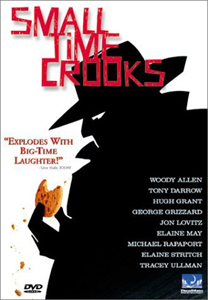
30. “Small Time Crooks” (2000)
This crime comedy has a fast-moving, accessible structure and a great coupling of two comedians – Allen and Tracey Ullman. In Act I, they’re poor; in Act II, they’re rich; and in Act III they manage to screw it all up. May comes in at the end to steal scenes – but not successfully steal the jewels — as an overly literalist neurodivergent. The film suggests that people’s core natures will always come back to bite them. But “Crooks” is not a think-piece; it’s a collection of funny set pieces and botched-scheme gags.
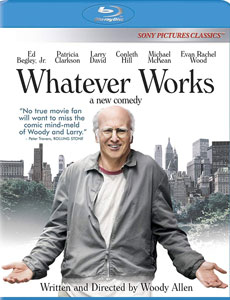
29. “Whatever Works” (2009)
Writers’ strikes are generally not good for movie fans, but sometimes neat things come from them. Not allowed to write anything new, Allen pulled out this old (and old-fashioned) screenplay and directed it. We get to see David, whose “Seinfeld” and “Curb” spring from Allen’s neurotic classics, play The Allen Role of Boris. Talented young Evan Rachel Wood plays Boris’ ridiculously younger wife Melody. Allen goes beyond a “Pygmalion” riff, as Melody isn’t merely transformed in class but also in opinions; it’s funny to hear cynical city-speak by way of her thick Southern accent.
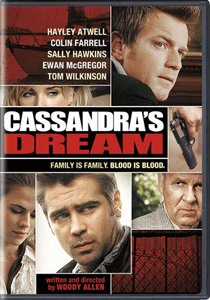
28. “Cassandra’s Dream” (2007)
Rather than a whodunit, “Dream” is a “will they do it” and then a “what will the cost be.” Down-on-their-luck brothers Ian (Ewan McGregor) and Terry (Colin Farrell) can turn their lives around if they are willing to commit a murder. In addition to crafting a fine study of how people’s inner moralities differ, Allen gets impressively stylistic. He lets “Dream” breathe more than usual, allowing room for a Hitchcockian score by Philip Glass. Though not as twisty as Allen’s elite crime stories, this one is emotionally gripping.

27. “Alice” (1990)
Allen is hit and miss when he transposes magical realism into a grounded story. This is one of the hits, as Alice (Farrow) goes to a Yoda-like man of Eastern wisdom (Asian character-acting legend Keye Luke) who teaches people to become invisible. Metaphorically, that’s Alice’s problem anyway; she has married a rich husband (William Hurt) and lost her own identity. Joe Mantegna and other strong actors prop up Farrow’s understated turn, while cinematographer Carlo di Palma contrasts Alice’s swank yuppie living conditions with the mystic’s earthy abode.
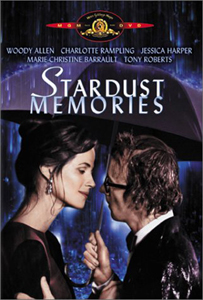
26. “Stardust Memories” (1980)
It’s confusing and overstuffed at first blush – featuring a film-within-a-film and three love interests (Charlotte Rampling, Jessica Harper and Marie-Christine Barrault) across time for Allen’s filmmaker Sandy. This film was especially jarring upon its release, as it asks for deeper engagement than his easy-to-absorb Seventies catalog. Thanks to in-your-face camerawork, bizarre demands from creative backers, and ridiculous contrasts like an autograph seeker interrupting an intimate conversation, “Stardust” shows us what daily life is like for a famous person. This could be a pretentious sob story except that Allen maintains enough of a sense of humor about it.
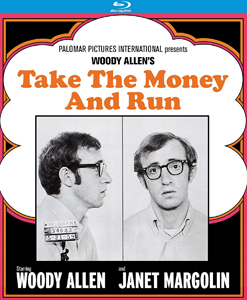
25. “Take the Money and Run” (1969)
Co-written with Rose
Allen’s first traditionally directed film (“What’s Up, Tiger Lily?” was a riff track) is also among the funniest of his five pre-“Annie Hall” goofball comedies, edged out only by “Love and Death.” We follow hapless criminal Virgil (Allen), whose exploits become even more ridiculous when playing under stentorian faux-umentary narration. This is our first peek at Allen’s favorite gags, including his oft-used “loudly shuffling feet,” and Zucker Bros precursors like two ventriloquists communicating via dummies in the background. The brisk pacing serves as a lesson to prior directors of his work (“What’s New Pussycat” and “Don’t Drink the Water”) on how this material should be delivered.
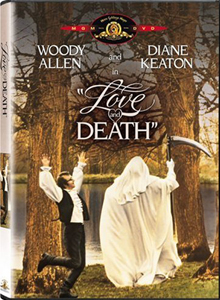
24. “Love and Death” (1975)
In my favorite of the early goofball comedies, Allen trades Pavel Chekov for Anton Chekhov – the sci-fi of “Sleeper” for the direness of Russian historic dramas. The drab cinematography endemic to Allen’s early films plays well here. Nonetheless, laughs are to be had with Boris’ (Allen) fish-out-of-water nature as an intellectual and hapless romantic — he can’t quite win over his second-cousin-once-removed Sonja (Keaton) — in a culture where everyone is a warrior. Fans of “A Princess Bride” and “Robin Hood: Men in Tights” will enjoy this brand of humor.
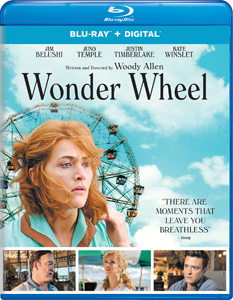
23. “Wonder Wheel” (2017)
This is a wonderful looking film, set in the 1950s Coney Island amusement park. Unusual for movies, the poor folks’ residence – where clam-shack waitress Ginny (Kate Winslet) lives with her abusive husband (Jim Belushi) – actually does look like a cheap hovel. With so much interlaced character drama – Justin Timberlake’s Mickey has eyes for both Ginny and her stepdaughter Carolina (an ethereal Juno Temple) – “Wonder Wheel” could be a Tennessee Williams stage play. Although I desired more details about Coney Island life, cinematographer Vittorio Storaro gives the film room to breathe.
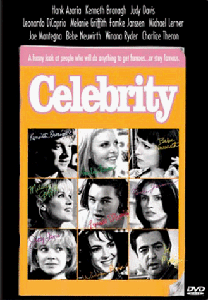
22. “Celebrity” (1998)
Allen goes deeper into the bizarre nature of celebrity life – and the very fact that humanity carves out a category of “celebrities” – than in “Stardust Memories.” At an unusually long (for him) 113 minutes, he gives us a lot to chew on as we follow exes Lee (Kenneth Branagh) and Robin (Judy Davis, in the best of her five Allen roles) through a contrasting, mirroring and looping five-act structure. The story ultimately punishes the bad guy and rewards the good gal, but Lee is so bombarded with bizarreness (notice his failed attempt to have a simple conversation with Leonardo DiCaprio) that we sympathize with him too. “Celebrity” is a rare thing: a profound farce.
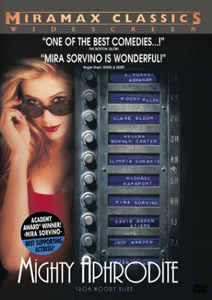
21. “Mighty Aphrodite” (1995)
Allen maybe didn’t intend for this film to be so unbalanced, with Mira Sorvino (rightly the Oscar winner for Best Supporting Actress) stealing every scene as a beautiful, monotoned, mentally inept and worry-free sex worker. Linda’s very existence fascinates Allen’s Lenny, the adoptive father of her inexplicably genius son, but that’s fine because she fascinates viewers too. The surrounding elements aren’t bad by any means – look for Peter Weller and Michael Rapaport as other absurd types of humans. Cutaways to a Greek chorus fortunately do not overwhelm the film, instead making the vibe more playful than weird.
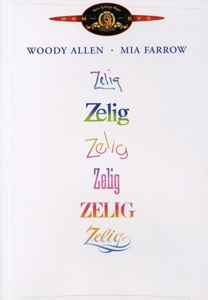
20. “Zelig” (1983)
Allen’s own “Take the Money and Run” tiptoed into the faux-umentary style, and the “Borat” films have taken it to another level of absurdity. “Zelig” is a pivotal entry in the genre, as Allen makes use of special-effects possibilities to maximize his storytelling. He plays the titular man who – in Forrest Gumpian fashion – has popped up at key events throughout history because he can blend in. Like a chameleon, he at various times is black, a Jew and a Native American, making him “a triple threat” to the KKK, as the deadpan narrator puts it. Zelig also infiltrates the Nazis, as we get humorous political commentary that’s more pointed than in “Bananas.”

19. “Manhattan” (1979)
Co-written with Brickman
This is simultaneously a case of giving “Annie Hall” fans what they want – Isaac could be a matured Alvy Singer, and Keaton plays overly analytical Mary – and of Allen doing what he wants, as this is a more laid-back film. The idea that Isaac and Mary aren’t a couple doesn’t ring true so soon after “Annie Hall.” But another relationship is fresh and fascinating: Isaac, 42, is dating 17-year-old Tracy (Mariel Hemingway). Similar to how Allen’s marriage to a wife 35 years younger is none of the public’s business, the same approach is taken here. Yet within the relationship, the age gap is a constant stressor, and Hemingway is excellent as a kid pretending to be an adult as a temporary measure until she actually is one.
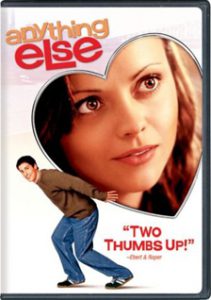
18. “Anything Else” (2003)
Coming off a couple films where sexagenarian Allen tried to play younger, he strikes upon an obvious yet important reset button: He casts a young actor in The Allen Role. This 20-something rom-com features “American Pie’s” Jason Biggs as Jerry and big-eyed Christina Ricci as Amanda, the girl whom Jerry adores but who is horrible for him. Meanwhile, Allen wisely casts himself as Jerry’s mentor, and makes room for self-mockery. We see Jerry’s shocked or grossed-out reactions to neurotic observations that would’ve been left unchallenged in older Allen pictures. By setting aside his ego, Allen adds an underrated gem to his catalog.
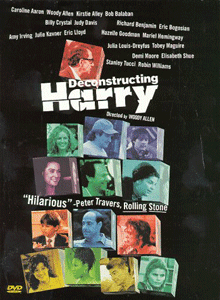
17. “Deconstructing Harry” (1997)
This is one of the best-edited Allen films, as Susan E. Morse deftly cuts up scenes to provide rollercoaster-ride energy not found in the initial takes. (Perhaps she learned from the failure of “Bullets Over Broadway.”) It has a super-meta premise: Harry (Allen) is a great writer, but only because he uses his friends as characters. His friends resent him for this, and we see him interacting both with real people and their fictional counterparts. This could be confusing, but it’s not, mainly because it’s darn funny. A highlight finds Kirstie Alley’s psychiatrist regularly breaking away from her patient to go into the other room and yell at cheating husband Harry.

16. “September” (1987)
Allen churned out this small gem amid perhaps the busiest time of his career – “Radio Days” came out the same year and he shot another version of “September” in its entirety, only to be unhappy with it and try again. He could pull it off because the film takes place in one house, built on a soundstage. But it’s perhaps the most outdoorsy indoor movie ever, as characters comment on the Vermont weather and the stars. It’s hard to pick the best among the six outstanding performers whose characters fret about love, life, legacy and sanity. As a “Law & Order” fan, I’ll point to Wiest and Sam Waterston, whose Steph and Peter are taken aback by their forbidden love, even though the feelings come from within.
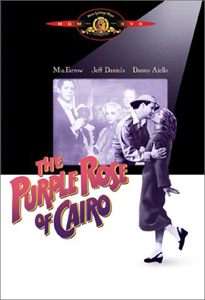
15. “The Purple Rose of Cairo” (1985)
This movie is set during the Depression – and Farrow’s Cecilia is abused by her thuggish husband (Danny Aiello) – yet it’s not depressing. By embracing his pure love of escapist cinema via Cecilia, Allen achieves a whimsical nostalgia. Future “Dumb and Dumber” star Jeff Daniels literally breaks out in dual roles, including movie-character Tom, who steps through the screen because he’s so taken by the woman sitting in the theater. “Purple Rose” isn’t a meta romp like the similarly reality-busting “Last Action Hero,” but nor does it have huge stakes, even when Cecilia must choose between the real/flawed Gil and the perfect/fictional Tom. It maintains a vibe of fantastical delight.
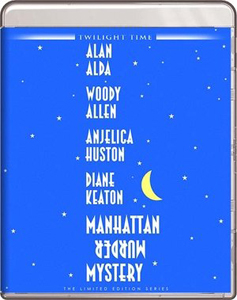
14. “Manhattan Murder Mystery” (1993)
Co-written with Brickman
This is Allen’s breeziest and best mashup of crime and comedy. Even though it’s a case of Allen and Keaton (as a comfortably married couple) going on one last cinematic fling, it ends up being forward-looking: a predictor of 2020s murder-comedies like “Only Murders in the Building” and “Based on a True Story.” Laughs come from the incongruity of comedy and killing, plus the flailing attempts by amateurs to solve a murder; they overthink and overlook. “MMM” humorously tiptoes toward infidelity while affirming the core couple, and a grand finale evocatively showcases an old movie theater.
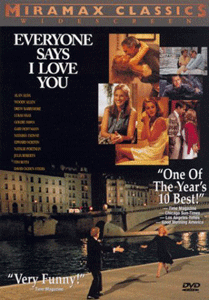
13. “Everyone Says I Love You” (1996)
Although we get a full range of love stories (some with happy endings, some not), this romp through three cities, four seasons and multiple generations of lovelorn folks ultimately lands on the sunny side. This is because it’s the closest Allen comes to a musical (with longtime collaborator Dick Hyman rearranging classic songs) – although the percentage of time devoted to song-and-dance is lower than average for the genre. Having Natasha Lyonne narrate the love stories from a teenage perspective adds both innocence and poignancy. Also look for a too-brief turn by Natalie Portman as a teen going through her first, universe-crushing heartbreak.
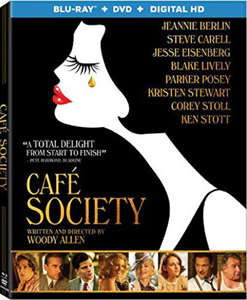
12. “Café Society” (2016)
This vibrant remix of Allen’s favorite themes is also an elite example of a lot of them. It demonstrates his sardonic appreciation for (some aspects of) show business in a way he couldn’t pull off in “Broadway Danny Rose” or “Hollywood Ending,” while also being more grounded than “Purple Rose of Cairo.” It’s not a musical like its 2016 competitor (and perfect double-bill companion) “La La Land.” But it does similarly journey through love and heartbreak – using proven pairing Jesse Eisenberg and Kristen Stewart (from “Adventureland”) the same way “LLL” uses Stone and Ryan Gosling (from “Crazy, Stupid, Love”).
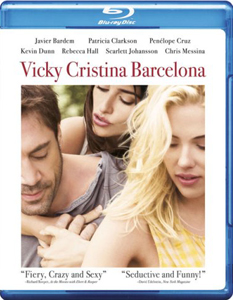
11. “Vicky Cristina Barcelona” (2008)
Thanks to a masterful Javier Bardem – dropping his villainous roles to play a suave lover of women, art and life – Allen paints a sumptuous and uncharacteristic portrait of how to live without shackles. Straight-laced Vicky (Rebecca Hall) is the counterpoint to Juan Antonio’s point of view, while fellow vacationer Cristina (Johansson) is more open to him. Rounding out the trio of women is dangerously sexy Penelope Cruz as Juan Antonio’s flighty lover who claims she doesn’t feel jealousy. With its Spanish city and countryside settings, “VCB” is a vacation from Allen’s usual haunts and life outlook. But in the end, it’s very much his type of character study.
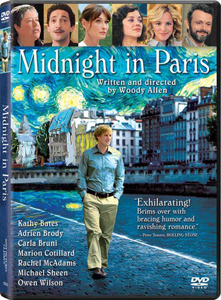
10. “Midnight in Paris” (2011)
This is the next best thing to visiting Paris – or better, if you don’t like traveling – as cinematographer Darius Khondji shows off the modern city and the production designers delightfully recapture the Roaring Twenties for the time-travel scenes. Owen Wilson is a refreshingly upbeat take on The Allen Character, a wide-eyed writer and history buff who is thrilled to meet F. Scott and Zelda Fitzgerald and other legends – and it’s cool how he’s not put off by their humanness. Not uproariously funny, “Midnight” is a pleasantly nostalgic stroll through love matches and artistic inspiration.
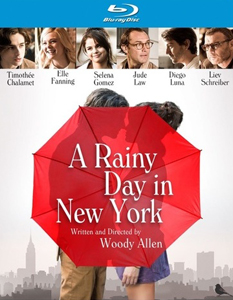
9. “A Rainy Day in New York” (2019)
In “Radio Days,” Allen notes that NYC is prettiest right after a rainfall, and this film proves it under Storaro’s lens. “Rainy Day” is a smooth-jazz refresher course in Allen’s catalog, as next-gen actors – Timothee Chalamet in The Allen Role; Elle Fanning and Selena Gomez as love interests – weave through the director’s home city amid a steady drizzle. Providing satire on the side are three distinguished (but absurd) older gentlemen (Liev Schreiber, Jude Law and Diego Luna) pursuing Fanning’s oblivious Ashleigh, an arts reporter for the Yardley Argus. The familiar beats become fresh again thanks to the cleansing weather and brand-new actors handling Allen material.
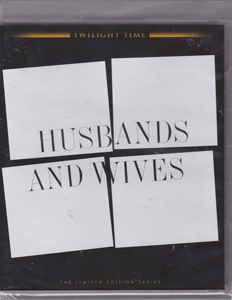
8. “Husbands and Wives” (1992)
Allen explores the “grass is greener” phenomenon – married people envy single folks, and vice versa – while peppering in the most stylization since “Annie Hall.” A precursor to “The Office,” the film is shot with hand-held cameras to evoke a documentary (although, strictly speaking, there’s no way the people would allow cameras into most of these situations). Plus, we cut away to analytical interviews. Allen (as Gabe) and Farrow (as Judy) start as a married couple, but he’s obsessed with young Juliette Lewis and she with suave Liam Neeson. The final explanation for everyone’s bad behavior is a remarkably profound shrug.
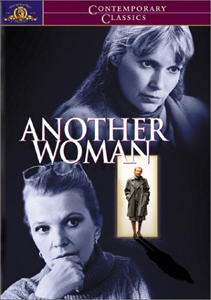
7. “Another Woman” (1988)
Gena Rowlands shines as Marion, a woman who is successful by any reasonable measure, yet finds herself melancholy upon turning 50. Allen likewise turned 50 around this time, but Marion isn’t neurotic (although she does have relationship strife, with Ian Holm and Gene Hackman as her stiff and suave options). The soberness of Marion’s reflections – as we see her life up to this point in flashbacks – makes “Another Woman” universal. Although Farrow’s Hope sees Marion as a cautionary tale, the film ultimately delivers a wise message: You shouldn’t let others define your metrics for happiness.
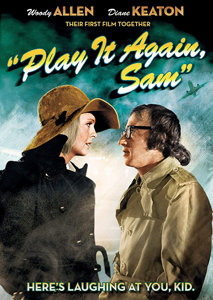
6. “Play It Again, Sam” (1972)
Directed by Herbert Ross
This pre-“Annie Hall” masterpiece is often overlooked because Allen only wrote it (based on his own play); he didn’t direct it — although Ross’ style is similar to what Allen would later embrace. In the “High Fidelity” of its time, film critic Allan (Allen) is both obsessed with and pathetic with women. Linda (Keaton, in her first of seven Allen collaborations) takes to him, though, leading to an unpredictable love triangle that also includes 1970s Allen regular Tony Roberts. The outcome is bittersweet, but “Sam” has enough brilliant pratfall comedy (Allan fails to be cool on a first date) and zingers (a depressed French girl builds her schedule around suicide plans) that you’ll smile rather than cry.
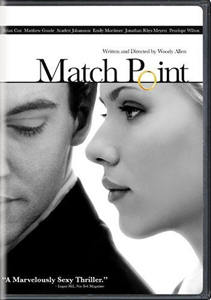
5. “Match Point” (2005)
This character study of a former tennis star (Jonathan Rhys Meyers’ Chris) has tremendous variety in its game. It shifts from an almost cute love triangle (rounded out by Johansson and Emily Mortimer), to a not-so-cute story of a cheating husband, to a howcatchem. It raises brutal moral questions while also commenting on an underrated aspect of life: dumb luck. Stylistically, “Match Point” is a master class, as Allen often keeps the camera not necessarily on who is speaking, but rather on who he wants us to think about. At 2 hours, it’s unusually long for a Woody film, but so twisty and engrossing that you won’t notice.
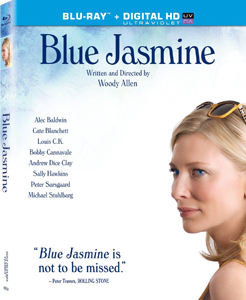
4. “Blue Jasmine” (2013)
This is Allen’s best film that he doesn’t act in, and his best film that spotlights an individual rather than an ensemble. Cate Blanchett’s title character is forced to learn how the other half lives and rebuild her life when her ex-husband’s (Alec Baldwin) ill-gotten riches disappear. While that gives Jasmine an arc, the film is actually about her clinical anxiety – something she suffered from even when wealthy. Sometimes glamorous, sometimes grimy, Blanchett takes Jasmine through a gamut of emotions. Her inconsistent behavior (talky one moment, staring into space the next) rings true for the condition. In an oeuvre filled with psychologically damaged leads, Jasmine – with a huge assist from Blanchett — is Allen’s most nuanced creation.
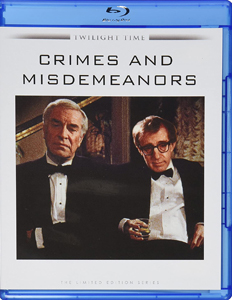
3. “Crimes and Misdemeanors” (1989)
This is actually two unrelated, interspersed movies, although they come together for a wrenching and thought-provoking clincher. One is about the idea that Cliff’s (Allen) ennui can be solved with an exciting new woman, Halley (Farrow, beautifully lensed by Sven Nykvist). The other is about the idea that Judah’s (Martin Landau) blackmail can be solved by hiring a hitman to kill Dolores (Anjelica Houston). These moral dilemmas – played out by a who’s who of Big Apple actors (look for “L&O’s” Waterston and Jerry Orbach) — unfold amid gorgeous walk-and-talks on beaches and leaf-strewn autumnal parks. As “C&M” features all of Allen’s favorite themes (misguided romance, relative morality, crime, religion), it’s an ideal film to recommend to a newcomer to his catalog.
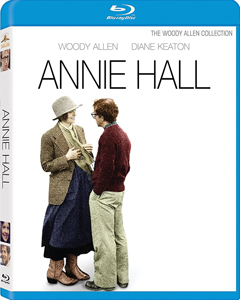
2. “Annie Hall” (1977)
Co-written with Brickman
1977 deserves consideration as one of the best movie years because it gave us both “Star Wars” and this candidate for funniest-ever rom-com. Allen’s mildly famous writer Alvy Singer is the POV character who almost understands women (but not quite), and the adorably bumbling Annie (Keaton) is the soulmate who makes the laughs glow. If it was presented straightforward, it would be a hilarious comedy about life and love, but “Annie Hall’s” stylistic additions push it to masterpiece status. It’s told out of order yet without confusion; Alvy breaks the fourth wall and does wish-fulfillment things like telling off a know-it-all loud-talker. And – in a precursor to “(500) Days of Summer” – the first-date scene shows how the characters’ ambitiously hopeful thoughts contrast with how things awkwardly play out.
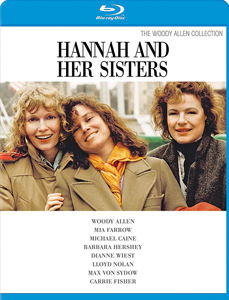
1. “Hannah and Her Sisters” (1986)
It turns out that having two Woody Allen Characters is not too much of a good thing. Michael Caine’s Elliot is obsessively, aggressively and hilarious smitten with an unavailable woman (Barbara Hershey’s Lee), while Allen’s own Mickey shops around for a new religion. They may be outshined, but the title trio – played by Hershey, Wiest and Farrow — are likewise well-explored as this large-cast drama leisurely but grippingly plays out over three Thanksgivings. Where “Interiors” is fatalistic, “Hannah” is hopeful, even amid its message that it’s extremely rare for any two people to be on the same page at the same time. This also marks a sea change in visual artistry for Allen’s films, as cinematographer di Palma takes us on a tour of New York City that would be appealing even it wasn’t the setting for Allen’s greatest masterpiece.

